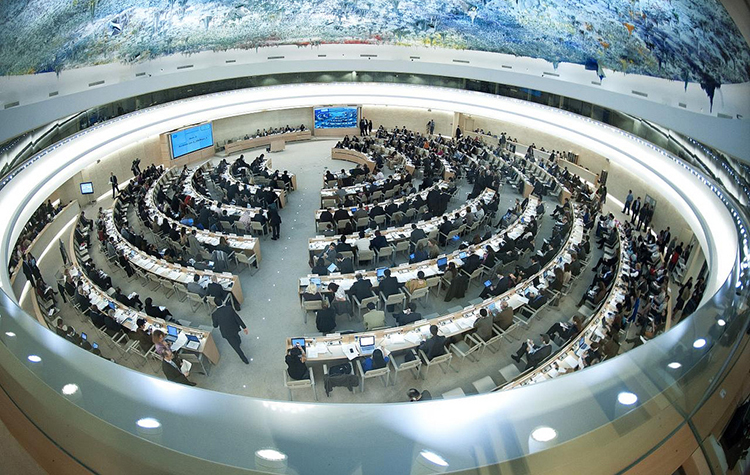(Geneva, 14 May 2016) – The Asian Forum for Human Rights and Development (FORUM-ASIA) calls on the Government of Thailand to take heed of the Universal Periodic Review (UPR) recommendations to end the rapid deterioration of the human rights situation in the country and return to democratic civilian rule.
The UPR is a unique peer review process created by the UN Human Rights Council to periodically review the human rights records of all United Nations (UN) Member States. All 193 Member States of the UN are reviewed once every four and a half years on the basis of international human rights standards, and their human rights obligations and commitments.
This is the second time Thailand underwent its UPR. Its first review took place in October 2011 when it received a total of 183 recommendations, of which the Government accepted 134 and noted 49.
According to the outcome report of Thailand’s UPR adopted by the UPR Working Group on Friday, 13 May, around 100 States made a total of 249 recommendations. Thailand has so far accepted 181 recommendations. The Government has until September to respond to the remaining 68 recommendations. The final outcomes along with the Government’s responses to these remaining 68 recommendations will be adopted officially by the Human Rights Council in September.
“This UPR of Thailand has once again exposed to the world the ruthless repression of human rights by the ruling junta”, says Evelyn Balais-Serrano, Executive Director of FORUM-ASIA. “The large number of recommendations made to Thailand, especially asking it to ensure the rights to the freedoms of expression and assembly and to protect human rights defenders, is a damning indictment by the international community of the dire human rights situation in the country.”
Thailand received over 20 recommendations related to the rights to the freedoms of expression and assembly, while at least 8 States called for the protection of human rights defenders.
It is noteworthy that the Thai Government has accepted many general recommendations to safeguard the rights to the freedoms of expression and assembly and to protect human rights defenders, and to redress reported cases of harassment and attacks against them. However, decisions on recommendations to end the stifling restrictions imposed by the military regime on these basic rights and fundamental freedoms are still pending.
After the coup on 22 May 2014, the military Government of Thailand imposed severe restrictions on the rights to the freedoms of expression and assembly and on the work of human rights defenders. Public assemblies of more than 5 people remain banned following orders of the National Council for Peace and Order (NCPO). The enactment of the Public Assembly Act 2015 only augmented these restrictions, giving unfettered discretionary powers to law enforcement authorities to ban assemblies on vague and arbitrary grounds, and prescribing harsh punishments for violations.
While the longstanding concerns over the draconian lèse-majesté law in Thailand remain, the NCPO has intensified its crackdown on free expression with overzealous application of Article 112 of the Criminal Code and the Computer Crimes Act, targeting critics and political activists. Similarly, the military regime has significantly increased the use of vague sedition provisions of the Criminal Code, especially against human rights defenders, political activists, and dissenters.
“We are disappointed by the Government’s responses to questions and recommendations regarding the undue infringements, especially on the rights to the freedoms of assembly and expression. Defending these excessive limitations as unavoidable necessities, the Government showed no intention to ease, let alone remove, the existing restrictions, or accept any recommendations made towards this end,” continues Balais-Serrano. “We note that the Thai Government informed during the UPR that it is in the process of amending the Computer Crime Act. If the Government is serious about amending this suppressive legislation to comply with international standards, it should start by accepting recommendations to review this legislation, and follow-up with open and public consultations with all involved, including civil society.”
The complete ban on public discussion of the draft Constitution ahead of the referendum scheduled for August 2016 and increasing prosecutions of civilians in military courts were another area of significant concern for the international community during the UPR.
“We reiterate the recommendations Thailand received to allow public and open debate on the draft Constitution and to end the military trials of civilians. If the Thai Government aspires to restore its reputation as a respected member of the international community, as it once enjoyed when it presided over the world’s premier human rights body between 2010 and 2011, it has little choice but to accept and implement the recommendations it received.” concludes Balais-Serrano, “Additionally, UN Member States have a duty to press the Thai Government to accept their recommendations and ensure that these recommendations are urgently implemented.”
About FORUM-ASIA:
FORUM-ASIA is a regional human rights group with 58 member organisations in 19 countries across Asia. FORUM-ASIA addresses key areas of human rights violations in the region, including freedoms of expressions, assembly and association, human rights defenders, and democratisation.
For more information, please contact:
– FORUM-ASIA United Nations Advocacy Programme, [email protected]
– FORUM-ASIA East Asia Programme, [email protected]




